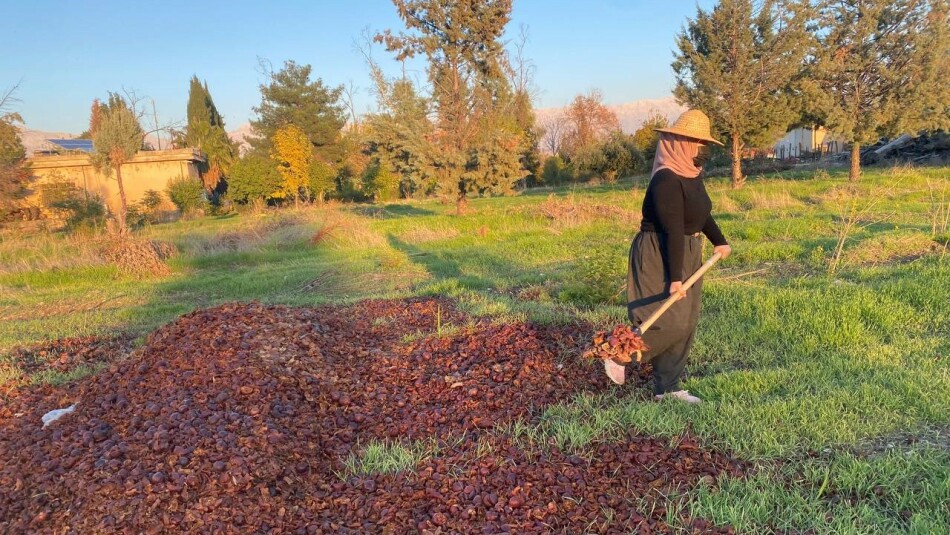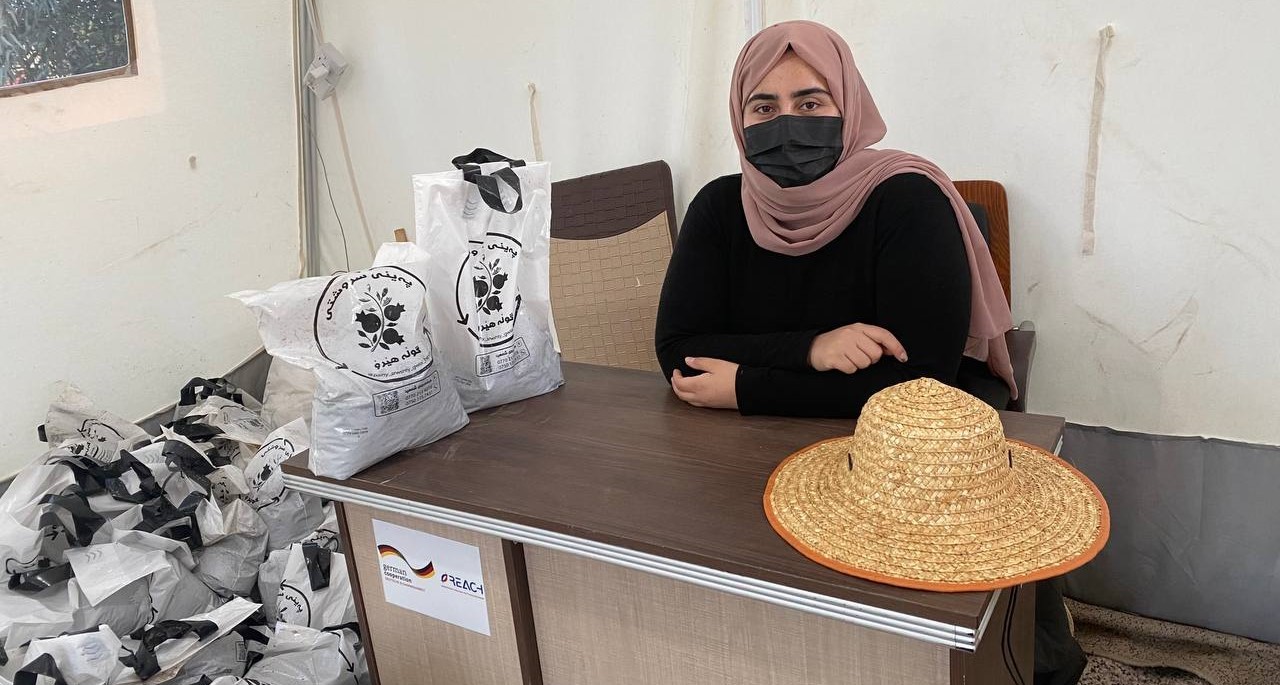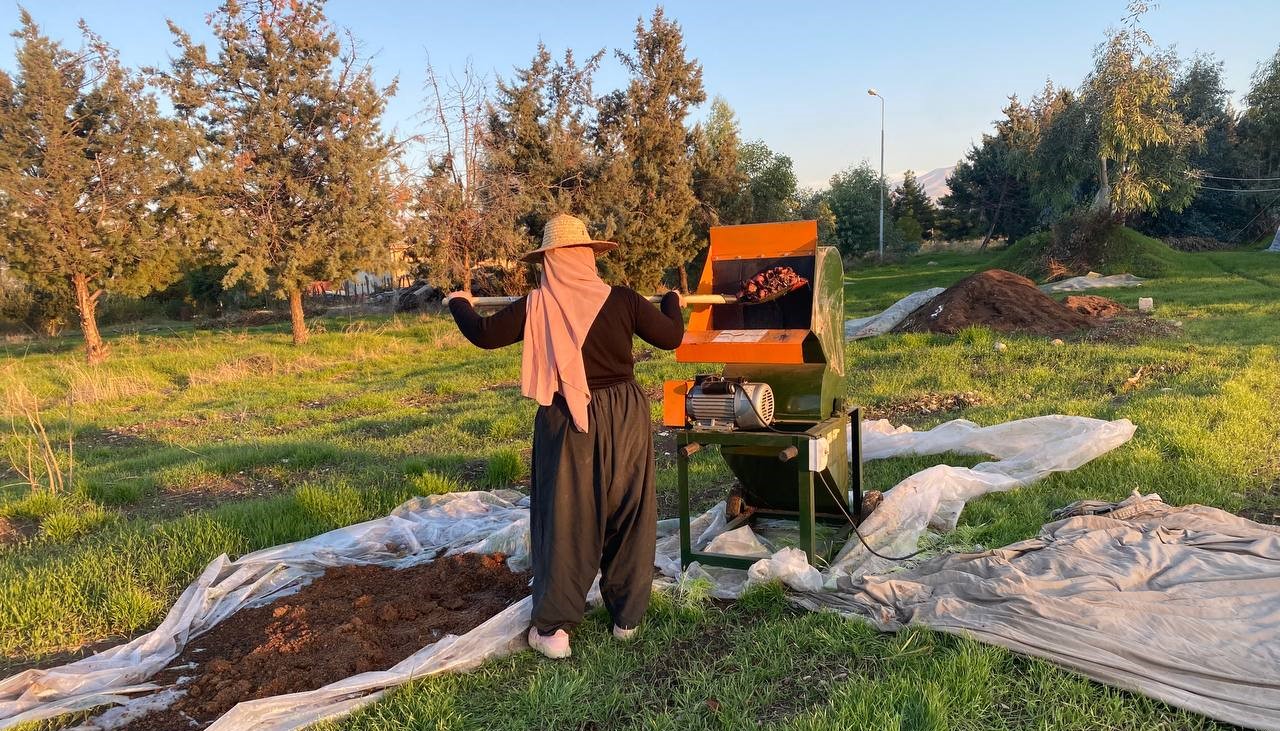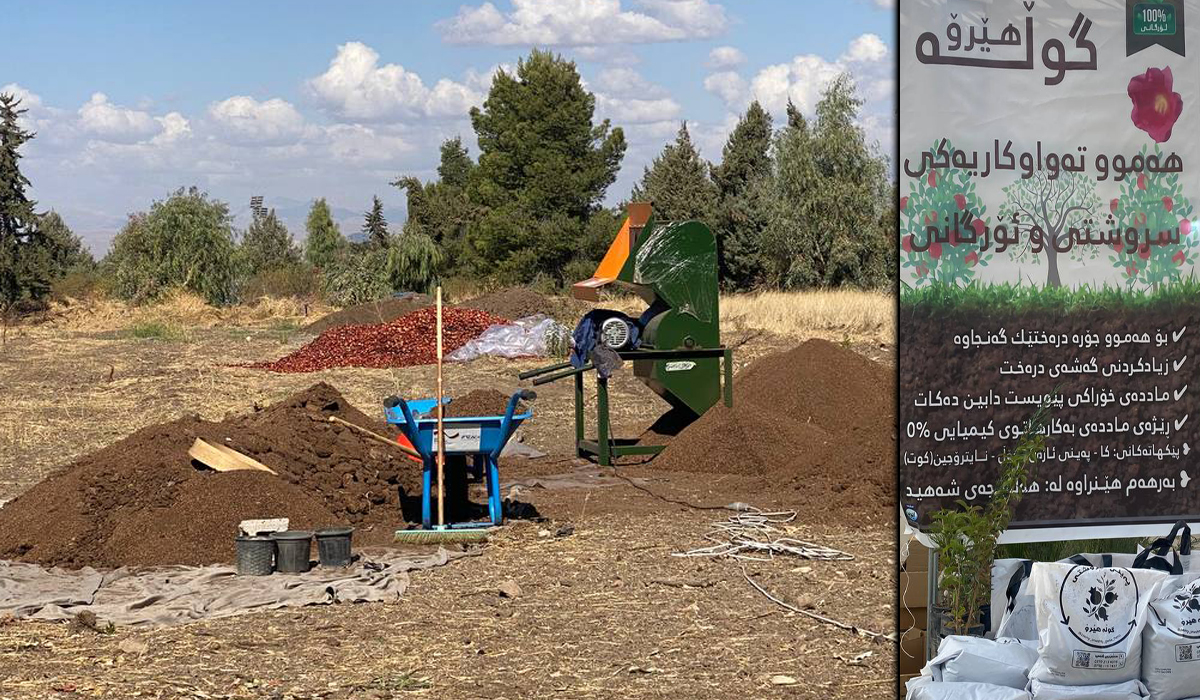
It is a simple idea, but the result is countless wealth for farmers and the environment; Sima Saman happened to see piles of discarded pomegranate peel in the Bazaar of Halabja, a town of Sulaimaniya well-known for its juicy and sour pomegranate, so one day and came up with the idea of how to turn it into a kind of natural compost.
On the day Sima came up with the idea, she was in the Halabja bazaar with her sister, passing by the pomegranate and olive milling factories, whose skins were scattered on the street, causing an unpleasant smell and distorting the environment.
“My sister said we can solve this problem together, reusing discarded fruit waste and peel for agricultural purposes,” said Sima, a graduate of Halabja Technical Institute who specializes in accounting. Her sister is still a university student at the College of Agriculture.
According to the agricultural statistics of the province, the annual production of pomegranates reaches (30) tons, which is part of the seeds and squeezed for fresh juice, at the beginning of the ripening season.
According to the same source, the annual production of olives in the same province is between 200-250 tons.
Gulla Hero Compost: Natural and Organic
Many people talk about the benefits of fruit, but Sima has benefited more from the peel than the fruit, once again making it an environmentally friendly product and at the same time a source of income.
After developing the idea of producing natural and organic compost from fruit and vegetable waste, she bought a grinding machine in the middle of this year. She set up the machine in Sirwan sub-district and named the factory Gulla Hero (Hollyhock) Natural Compost.
I was the first in the family to agree and said let's open the factory kids
Sima said that the Gula Hero project soon started, they collected a lot of pomegranate and other fruit waste in the factory, to put the first product of compost on the market.
More than 150 tons of garbage are collected daily in Halabja province. Most of it is food waste, which is eventually dumped in a ditch several kilometers outside the city, near the village of Tapa Kura.
Food waste generally decomposes six months after being buried, releasing lead gas, which has a very negative impact on the environment.
Hero Salih, Sima's mother, is happy with her daughters' initiative and encourages them not to give up.
“At first they found it difficult to decide to set up the factory, but I told them I am behind you and let's open the factory, kids.”
At the beginning of the project, she was hesitant, as it is not an easy task especially for women, to collect the fruit peel, transport it to the factory, go through several different stages to grinding and then prepare it for packaging and marketing.
“I have a very strong will. I was unloading the peels to the factory myself. I was also serving them the meals every day. There is a good demand for our products and people are very cooperative.”
Hero says there is a lot of pomegranate peel and other fruit waste in Halabja, as there are different products in most seasons.
Recycling solid waste and food is one of the ways to combat environmental pollution. According to UN statistics, Iraq is the fifth region in the world to experience the negative impacts and consequences of climate change.

Sima says she is working to collect waste from the Sulaimaniya wholesale grocery as well to expand the factory and work in all four seasons, and generate jobs opportunities for others.
About 17% of food production, including fruits and vegetables, is wasted worldwide, the United Nations urges people to turn the rest into compost.
Rizgar Ibrahim, a worker at the Gula Hero factory, works in all the stages of making the compost. Although he says the work is difficult, he likes it.
“The product is 100% natural. It also makes plants and trees grow faster.
He believes there is need for raising awareness among farmers to replace chemical fertilizers with organic compost which is more useful for agriculture and the environment.
One ton of waste: 1,000 bags of compost
Sima's natural compost factory produces 1,000 bags of compost from one ton of fruit peel, which is 1,000 kilograms, by mixing other ingredients.
Sima runs the factory with her sister, mother, uncle (Mother’s brother) and a worker because it is still in its infancy and they have not expanded.
Initially, she collected two tons of pomegranate peel, along with two tons of olive waste, one ton of hay and some other waste such as strawberry peel and vegetables.
She moved all the waste to the factory and started producing compost. It goes through several stages from soaking, drying and grinding until it becomes a good compost.
“Each ton of peels produces 1,000 bags of compost. I have produced 600 kilograms of compost so far and they have passed the test,” Sima proudly said.
Each bag of compost weighs between two and three kilograms. Each kilogram of compost is sold at 3,000 Iraqi dinars IQD (USD2) in Halabja bazaar and it suburbs. The product is familiar now in the region for the farmers, nursery owners and the locals in general.
“The work is going on smoothly. Some farmers asked me to turn the remnant of their orchards like the leaves and branches of their trees into compost.”
Organic compost is very important and has many benefits for agricultural
Natural fertilizers and compost are considered a good alternative to chemical fertilizers, which the United Nations encourages, as chemical fertilizers damage soil structure and organisms, and are a source of environmental pollution, especially water resources.
Star Mahmoud, director general of agriculture in Halabja, said, “organic compost is a very important need and has many benefits for the agricultural sector.”
This year alone, Halabja Agriculture Department has assisted more than seven young boys and girls who had natural compost production projects, through guidance by experts.
"We intend to further develop this type of compost, to bring great benefits to agriculture, even if these young people need materials, tools and financial aspects, we will help them per our capacity.”
In Halabja, 2,350 farmers work in horticulture and more than that number in grain production, mostly young, but most do not use natural fertilizers and compost, according to Mahmoud, since farmers are not yet familiar with how to make and use, although it is easy and inexpensive.
Compost is the best substitute for the harmful effects of chemical fertilizers, so the agriculture department is caking on farmers to stop using pesticides and chemicals that are harmful to the environment and health.
According to the guidelines of the Food and Agriculture Organization of the United Nations (FAO), what chemical fertilizers have failed to do, natural fertilizers do, as it strengthens the soil capacity and enriches it with phosphorus and other nutrients.

Khushkan Fayeq, owner of Khushkan Nursery in Halabja, has been gaining experience in this business for five years and has used natural fertilizer from Sima’s.
“The fertilizer is very strong and good for orchards, trees, agriculture and vegetables yet the only problem is that its expensive.”
Therefore, she produces a kind of organic compost from a mixture of animal waste by using some leaves and other material and sometimes sells her fertilizer to customers along with the flowers.
Khushkan also said that Sima is not producing a big quantity. “People do not know it and are not familiar with its use, so there are few users. People are not in a good financial position to buy flowers, trees and compost. Farmers and gardeners don't buy it and are not aware of its benefits.”
From the soil and to the soil
What users of natural compost are happy about is that there is no danger, because they are made from the waste of products produced from the soil and nature and their compost can be mixed with the soil again without any negative consequences.
“Sima's compost is the biggest benefit to the soil and the agricultural sector,” said Sheikh Qadir Abdulqadir, a farmer and shopkeeper who has been selling agricultural equipment, pesticides and fertilizers in Halabja for years.
He hopes that Sima's factory will “produce compost very scientifically and successfully and find good buyers in the future because it is still new.”
Different types of natural fertilizers play a role in healthy growth of fruits and vegetables, protect crops against diseases, because they compensate for nutrient deficiencies in the soil and plants, improve soil quality.
Omed Ahmad is a farmer uses the home-made copost for the production of pomegranates, tulips, chestnuts, saffron and other fruits, in addition to flowers, seedlings and his garden.
“I see they all grow very well.”
He has decided to produce his own compost from peel of fruit and leaves of trees.
He has rebuilt his garden and work has reached its roof, where he grows onions and some other vegetables with the same natural fertilizer he produces. He uses it for his own garden and shares it for free with neighbors as well.
“It is a very good compost, rich with energy and minerals, fights diseases and causes no harm to humans.”
Omed is concerned about the poor quality of the compost used by farmers especially chemicals by farmers, making the soil is loose its fertility.
This compost is the product of nature itself, so it is from nature to nature and it is harmless
The Environmental Protection and Improvement Board of the Kurdistan Regional Government (KRG) has repeatedly encouraged farmers and citizens through its social media accounts and statements to protect and fight soil pollution by using organic instead of chemical compost.
Dr. Karzan Abdullah, an expert in environmental sciences, explained that compost is organic and is produced from leaves, plants, delicate branches and stems of trees, pomegranate peel, olives and fruits such as apples and strawberries.
“Few farmers can control the use of chemical fertilizers and use them in a standard way,” Abdullah believes. He encourages them to make their own natural fertilizers.
“This compost is the product of nature itself, so it is from nature to nature and it is harmless. Compost rapidly fertilizes soil.”
The soil science expert says organic compost increases soil vitality, the ability of roots to absorb nutrients, so the plants will be wet, full of water, green and beautiful, have better products.”
The challenges are twofold
One of the obstacles facing Sima is traffic problems. Her house in the center of Halabja and Gula Hero factory is in Sirwan sub-district which is not far away as it takes only ten minutes by car, but it is a financial burden.
“We have to pay 10,000 dinars every day for transportation, except for transporting fruit peel and waste to the factory, so I couldn't even buy a small device due to lack of financial resources,” Sima said.
Two aid organizations helped her to cover half of expenses for building her plant. Now she needs more equipment and cannot afford it.

“Marketing my product and introducing it to people is another big problem for me because people and farmers are not very familiar with it,” she added.
She puts the product in two different sizes. On the bag, there are pictures of pomegranates and olives, along with the name of the product and other information about its composition.
Jamal Mohammed, owner of Brwa nursery, said, “It is very good and strong. Unfortunately, there are problems with marketing because people, especially farmers, have low scientific awareness and should buy compost which is more useful than chemicals causes body and environmental harms."
Mohammed also was producing his own fertilizer but stopped it. He proposes for the government to subsidize it, so that farmers can buy a lot of compost because it is expensive for them.
“If I buy a lot of compost, I will lose a lot because people do not buy it,” he said Farmers should use it.
Farmers have a long history of using chemical compost, so it is not easy to give up in a day or two and turn to natural compost.
Sheikh Qadir, an agricultural equipment shopkeeper, said he is selling the compost, sometimes forcing the customers and explain its benefits, otherwise they do not buy it, because the compost still needs to be known to people and replace chemical fertilizer. He is calling on farmers to, "Turn to natural compost and protect the environment.”
*This story has been produced as part of the program to expand the role of women journalists in environmental coverage, implemented by KirkukNow Media Outlet and financially supported by the Ministry of Foreign Affairs of the Federal Republic of Germany.